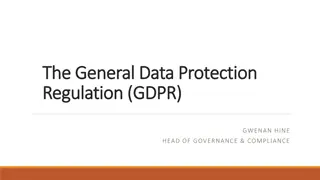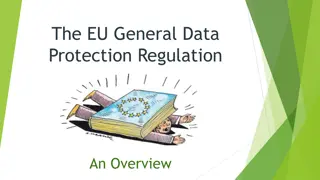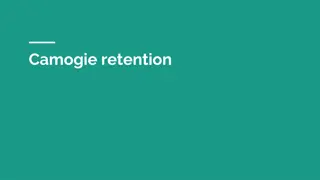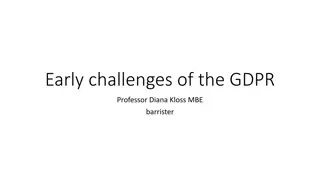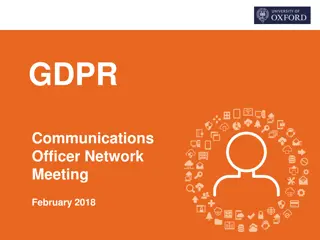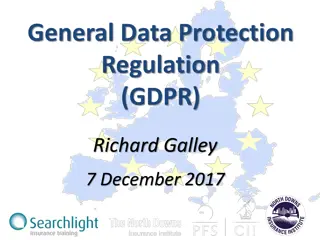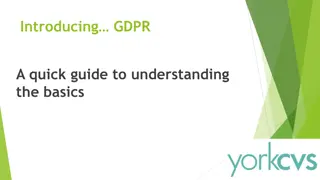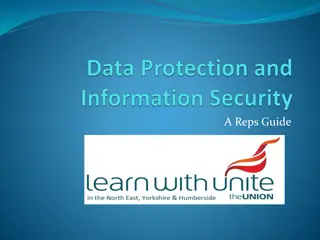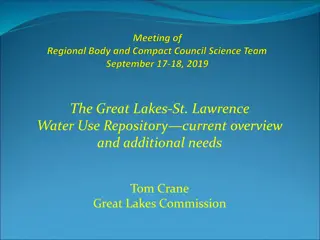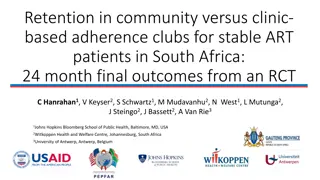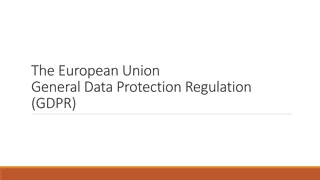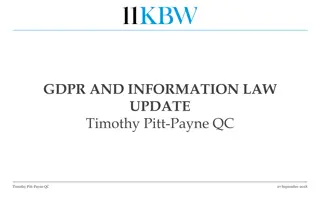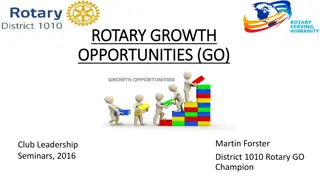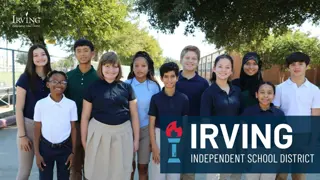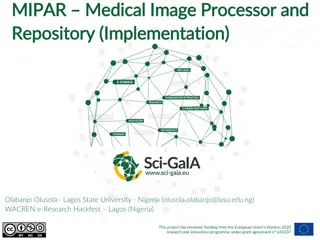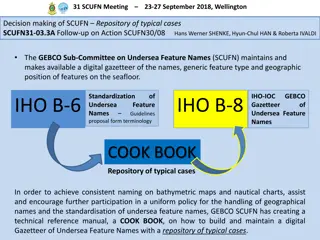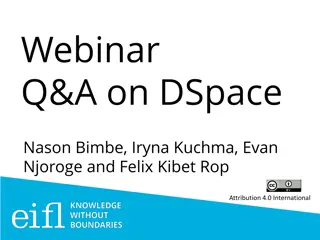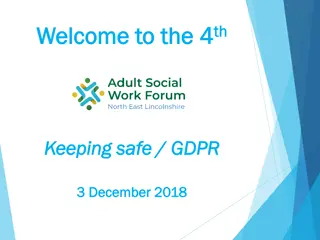GDPR Repository for Camogie Clubs: Access and Guidelines
Access up-to-date content, templates, and membership forms for Camogie Clubs through the GDPR Repository on the Camogie OneDrive. Learn about data protection FAQs, consent requirements for publishing photographs online, document retention guidelines, and more.
Download Presentation

Please find below an Image/Link to download the presentation.
The content on the website is provided AS IS for your information and personal use only. It may not be sold, licensed, or shared on other websites without obtaining consent from the author.If you encounter any issues during the download, it is possible that the publisher has removed the file from their server.
You are allowed to download the files provided on this website for personal or commercial use, subject to the condition that they are used lawfully. All files are the property of their respective owners.
The content on the website is provided AS IS for your information and personal use only. It may not be sold, licensed, or shared on other websites without obtaining consent from the author.
E N D
Presentation Transcript
Data Protection
DATA PROTECTION GDPR Repository for Camogie Clubs OneDrive All up to date content, templates and Membership Forms can be accessed on the GDPR Repository for Camogie Clubs on the Camogie OneDrive. Access to the Camogie OneDrive is available to all Club Officers with @camogie.ie email accounts by following the screenshots below. If you do not have access to a camogie.ie account, please email dataprotection@camogie.ie for access to the Repository.
DATA PROTECTION FAQ s 1. Where can I find the most up to date Membership Forms? Up to date Child, Juvenile and Adult Membership Forms are available in an Treoir Oifigi il (Official Guide), on the website www.camogie.ie/dataprotection and in the GDPR Repository for Camogie Clubs. 2. Does my Club need a Data Protection Officer? No. Clubs should identify a person/group designated with responsibility for compliance with data protection. However, individual Camogie Clubs do not require a Data Protection Officer. The Camogie Association centrally has provided access to a Data Protection Officer for Clubs and the Camogie Association s DPO can be contacted at dataprotection@camogie.ie for any questions, queries, issues or concerns Clubs may have in relation to data protection. 3. Is consent indefinite? No. If consent is being used by a Club as the legal basis for processing an individual s information (e.g. consent for photographs, for ticket sales for the Club dinner dance etc.), the Club must ensure it provides the individuals with the opportunity to refresh such consent on a regular basis. Consent cannot be deemed to be indefinite. Each time consent is captured, the Club should allow members an opportunity every 2 years to refresh such consent.
DATA PROTECTION FAQ s 4. Do Clubs require consent to publish photographs of members online? Yes. Prior to photographs of any member being published on the Club s website or social media, the Club must be sure it has the appropriate consent captured for the member. Appropriate consent mechanisms are included in the Official Membership Forms. Clubs should now use the Official Membership Forms going forward which will ensure consent is captured in a GDPR compliant manner. In relation to photographs of children, the Child and Juvenile Membership Forms require parental consent as is Camogie procedure. Official Membership Forms can be accessed in the Official Guide, on the GDPR Repository for Clubs or at www.camogie.ie/dataprotection. At Club events, such as medal presentations etc., if photographs are being taken of the crowd, the Club should inform attendees prior to the photo(s) being taken to allow attendees to choose whether they wish to be in such photograph(s) or not. 5. Does the Camogie Association have updated advice on Social Media? Yes. This is available in the GDPR Repository.
DATA PROTECTION FAQ s 6. How long should ID documentation be stored? ID documentation collected in relation to the process of Garda Vetting members, for example, photocopies of passports, utility bills etc. should be stored for the maximum period of one year. The Data Protection Commission has advised that this should be the retention period for all ID documentation related to Vetting procedures. In order to streamline the process, once a Club is satisfied that the Vetting has been completed, the ID documentation associated with the application should be deleted. 7. Can Clubs use personal laptops/tablets/devices? Many clubs rely on their Officers to use their own PCs to conduct Camogie business. All of the Camogie Association's systems are web based and, as a result, are accessible from any internet connected device. The data belonging to the Club should be stored within those systems (i.e. within the registration system or within OneDrive). Any spreadsheets or word documents that reside on the local drive should be password protected by clicking File in the top left corner and protect document . All Club information containing personal data should be stored within the OneDrive rather than individual hard drives. 8. How do I get access to OneDrive? All Club Officials with a @camogie.ie account (Camogie Secretary) have access to the Camogie OneDrive by following the screenshots on Slide 1. The designated Officers can then grant access to the OneDrive to additional Club Officers as necessary.
DATA PROTECTION FAQ s 9. Should Clubs implement a process around teamsheets? Yes. An important element of games administration within the Camogie Association is the provision of teamsheets to the referee and the opposing team prior to the match beginning. Clubs should ensure their teamsheets are stored in a secure manner together with the rest of the information Clubs hold, and that they are securely deleted on a regular basis. Teamsheets received from the opposition team should be treated with similar respect and deleted along with the Club s own teamsheets once they are no longer required. 10. Are Clubs advised to use Whatsapp? There are a number of issues with WhatsApp when used in an official Club capacity and we are therefore advising against its use for communicating with members and/or transferring personal data such as team sheets, referee reports etc. These issues relate to data protection concerns, but also other concerns from a Club's perspective. Firstly, if a WhatsApp group is set up everyone in that group has their name, phone number and possibly profile photograph if they have one, shared with everyone else in the group. Similarly, the lack of auditing ability the Club has over a WhatsApp group is an issue. This is an issue for a number of reasons outside of GDPR and data protection also. For instance, if a member in a WhatsApp group were to post unsuitable material to the WhatsApp group, and then leave the group, the administrators of the group cannot remove such material. The lack of auditing ability also makes it difficult to comply with a Subject Access Request or request for deletion if one were received.
DATA PROTECTION FAQ s 11. Is the GAA App an alternative communication method to WhatsApp? Yes. The newly updated GAA App which is available for download on both iOS and Android includes a messaging functionality within the App whereby the Club can communicate with its members via free in-app messages in a GDPR compliant manner. Clubs can set up groups within the App (e.g. senior players etc.) and send communications based on the groups. In development at the moment is also the functionality for coaches to utilise the GAA App as a messaging system and Clubs will be updated once this functionality is enabled. 12. Can Club Officers share passwords to systems? No. Under no circumstance should passwords to any Club systems be shared. Login details and passwords to all Camogie systems including the Games Management System (Servasport) and the Injury Fund Database are for the individual provided with such only. Access to these systems is only applicable to those with a requirement to access the systems and therefore they should never be shared.
DATA PROTECTION FAQ s 13. Can our members contact details be shared with sponsors/local businesses etc.? No. Camogie Clubs process their members contact details for the purpose of running the Camogie Club only. Members will not have envisaged that their information would be passed on to third parties for marketing purposes, and therefore, such information should not be provided if requested.
DATA PROTECTION FAQ s 14. Does every member have to sign a Membership Form? Due to the changed landscape in data protection in the past year, yes, we are recommending that every member signs a membership form (whether it be in paper or online) in order to ensure they are presented with the privacy notice which is on page 3 of the membership form. Following this, every 2 years members should be given the opportunity to sign a new form. If your Club is using the GAA App, this is not necessary for those members using the App as they will have control over their consent preferences on an ongoing basis. 15. Can a Club use an external third party to collect Membership and Registration details online? Yes, Clubs can use third parties to collect Membership/Registration details online. If a Club is planning to use a third party in this manner, there are several items the Club must first complete. Firstly, the Club must satisfy itself that the third party is reputable and compliant in respect of Data Protection requirements. The Club must then have a documented Data Processing Agreement in place with the third party (and any other third party(s) used by the Club to process personal data). There is a template DPA available on the GDPR Repository for Camogie Clubs. Once the Club has satisfied these requirements, it is then essential to ensure that the online Membership Form is identical to the paper based one as contained in the Official Guide which must contain the privacy notice. Clubs must ensure that their system provider can ensure this is the case.
DATA PROTECTION Supports Available GAA App To help with GDPR Compliance (and general efficiencies for clubs) the GAA has developed a Mobile App which provides valuable functionality to both Members and Club Officials. It provides clubs with the ability to allow their members to: 1 - Login using their Club specific credentials 2 - Maintain / edit their Personal Information in a secure manner 3 - Review Club Privacy Notices and Privacy Right statements 4 - Give / revoke consent for club communications 5 - Receive Club communications in an auditable and controlled manner 6 - It also supports on-line payments of club memberships at registration time 7 - It helps clubs to reduce the risk associated with Paper It removes the burden on administrators of keeping data up to date. 8 - It removes the need for administrators to manage consent 9 - It provides a free, controlled mechanism for Club communications Further information on the GAA App is available in the GDPR Repository for GAA Clubs.
DATA PROTECTION Supports GDPR Repository for Clubs The Camogie Club Repository should be your Club s first port of call for guidance, templates and advice in relation to Data Protection compliance within your Club. The Repository contains Membership Forms, Definitions, Website Privacy Notice Template, Data Processing Agreement Template, Data Protection Impact Assessment Template, Legitimate Interest Assessment Template, Personal Data Inventory/Processing Activities Log Template, Data Breach Process, Subject Access Request Process and a booklet entitled GDPR for Camogie Clubs . Data Protection Officer The Camogie Association have a full time Data Protection Officer available to assist Clubs at all times. Our Data Protection Officer can be contacted at dataprotection@camogie.ie any time your Club has a question, query or concern in relation to the processing of personal data within your Club.
For further guidance and advice in relation to Clubs responsibilities and obligations under the updated Data Protection legislation, please see the booklet entitled GDPR for Camogie Clubs contained within the GDPR Repository for Camogie Clubs.


